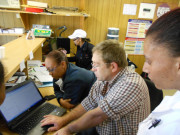Alongside the Cochrane Reviews being prepared with a special focus on COVID-19, we have many reviews that provide useful information for policy makers during the pandemic. Among these is a new qualitative evidence synthesis from March 2020 on the use of mobile devices by health workers. In this podcast, Adriaan Odendaal speaks to lead author Willem Odendaal from the South African Medical Research Council about the review’s findings and its relevance to COVID-19.
Monaz: Hello, I'm Monaz Mehta, editor in the Cochrane Editorial and Methods department. Alongside the Cochrane Reviews being prepared with a special focus on COVID-19, we have many reviews that provide useful information for policy makers during the pandemic. Among these is a new qualitative evidence synthesis from March 2020 on the use of mobile devices by health workers. In this podcast, Adriaan Odendaal speaks to lead author Willem Odendaal from the South African Medical Research Council about the review’s findings and its relevance to COVID-19.
Adriaan : Hello Willem, perhaps you could begin by letting us know why your review on health workers’ views and experience of the use of mobile phones and tablet computers in primary health care is so relevant in the COVID-19 era?
Willem: One of the main reasons is that the physical distancing that we now have to follow means that, more than ever before, we need to know about ways in which health care can be delivered remotely. Whilst mobile health, also called mHealth, has been around since the late 1990s, COVID-19 makes it imperative that we provide decision makers and practitioners with the most recent, high-quality evidence that can inform their use of mHealth today.
Adriaan: Can you give us an example of how mHealth might be used to help with COVID-19?
Willem: In the pre-COVID literature, we found many examples of lay health workers using mHealth to serve patients in remote areas for things such as consulting with a clinical colleague about the diagnosis or treatment of a patient, and there is no reason why it cannot be used in the same way for diagnosing and treating COVID-19 in people who live near to a health facility, as well as those living some distance away. For example, here in South Africa mobile phones are already part of the COVID-19 surveillance response and have been given to health workers to support tracking and tracing of COVID-19 cases.
Adriaan: Turning to your review, why is it so relevant to COVID-19?
Willem: As a starting point, although we worked on the review before the pandemic, our focus on existing qualitative research means that we’re able to suggest how the views and experiences of health workers about using mHealth might be especially useful now. We found three key things that should help policy makers and practitioners considering mHealth in the COVID context. Firstly, health workers should be part of the planning and implementation for any mHealth programme. This will encourage them to take ownership of the programme and help to identify challenges beforehand. Second, it’s clear that health workers welcome the benefits of mHealth and recognize that it can improve their work and relationships with each other and with patients. Finally, though, mHealth cannot be regarded as the solution for COVID-19. These technologies are merely tools of the trade, and not the skills of the trade. Quality health services requires things such as sufficient numbers of well-trained staff, sound interpersonal skills and commitment from health workers, and a well-functioning health system. When these basic ingredients are in place, mHealth can play a major part in combating COVID-19.
Adriaan: Thanks, it does sound as though mHealth has an important role to play. Do you have any final comments, and can you let us know how people can get hold of the review?
Willem: Firstly, we need to remember the general challenges for mobile technology: poor network coverage and access to electricity are some of the realities that make it difficult to use mHealth in some settings, such as low- and middle-income countries. With that in mind, we still need to leverage the many benefits that mHealth offers to the fullest. This requires careful consideration of the socio-cultural contexts in which mHealth is used, and high-level political buy-in to support it. It’s also important to find ways to integrate the functionalities of these technologies into other parts of the health system. To give you an example: if a health worker records her services to a patient on a mobile phone, directly importing this information into the patient’s existing record in the health facility would make mHealth a sustainable part of routine services. Finally, our full review is available online. If people go to cochranelibrary.com and simply search for ‘mHealth worker’, they’ll find it.

